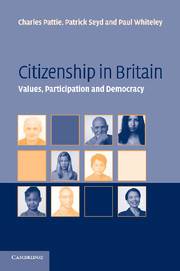Book contents
- Frontmatter
- Contents
- List of Figures
- List of Tables
- Acknowledgements
- Preface
- 1 What is Citizenship?
- I Understanding Citizenship
- 2 Civic Beliefs and Citizenship
- 3 Civic Behaviour and Citizenship: Macro Politics
- 4 Civic Behaviour and Citizenship: Micro Politics
- II Modelling Citizenship
- III The Consequences of Citizenship
- Appendices
- Bibliography
- Index
4 - Civic Behaviour and Citizenship: Micro Politics
Published online by Cambridge University Press: 22 September 2009
- Frontmatter
- Contents
- List of Figures
- List of Tables
- Acknowledgements
- Preface
- 1 What is Citizenship?
- I Understanding Citizenship
- 2 Civic Beliefs and Citizenship
- 3 Civic Behaviour and Citizenship: Macro Politics
- 4 Civic Behaviour and Citizenship: Micro Politics
- II Modelling Citizenship
- III The Consequences of Citizenship
- Appendices
- Bibliography
- Index
Summary
We suggested in chapter 3 that people's civic engagement is more diverse than traditional approaches to the study of politics often recognise. People's political activities extend well beyond the traditional ones associated with elections and Parliament. We may safely assume that their conception of politics is also broader than one which concentrates upon governments, whether national, state, regional or local. For individuals concerned with the daily essentials of life, such as food, income, health, habitation, knowledge and security, their experience of politics will not be with the formal institutions of government such as Parliament or ministries, but rather with a range of bodies and people who are continuously mediating their daily lives: for example, the hospital, the surgery, the school, the old people's home, the benefits agency, the social services department, the police station, and the place of work. Within these organisations such people as the doctor, the nurse, the teacher, the care worker, the policeman, and the employer will be their contact point with the state. Furthermore, politics in this sense is not episodic, like voting which takes place at periodic intervals, but ever-present and continuous.
Day by day people interact with the state as they conduct their lives. Increasingly over recent decades, however, the state has devolved its responsibilities to a range of other authorities. There has been a retreat from the post-1945 universal, collective provision of many services to the selective, private provision of the twenty-first century.
- Type
- Chapter
- Information
- Citizenship in BritainValues, Participation and Democracy, pp. 110 - 126Publisher: Cambridge University PressPrint publication year: 2004



